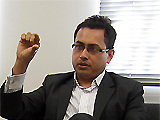Interview with Research Fellow: Abu Shonchoy
“Passionately Searching for Solutions to Poverty in Bangladesh”
[ 日本語版はこちら ]
Major: Development Economics, Poverty Studies in Bangladesh
You are a research fellow in development economics and poverty in Bangladesh. Let us hear your initial motivation for entering this field.
Originally, in my high school days, I was a natural science student and my favorite subject was physics. Although my father was a banker, my family wanted me to be a physicist or an engineer. However, after entering Dhaka University, I choose to shift from natural science to economics. Economics was not a popular choice for natural science students, nor was it a welcome decision for my family. However, I continued my journey in economics and really liked the courses and the way of thinking in the field. Before moving to economics, during my time in high school, I had no opportunity to take any social study subjects. So everything was very new to me.
My major is in development economics. The area where I am currently working is in Northern Bangladesh. It is far away from Dhaka, and isolated because there is no means for direct communication.
In 2005, after finishing my master’s course, one of my friends, Dr. Abu Shahriar, started to talk about the issues and problems of poverty in Northern Bangladesh. Interestingly, the first time I visited there was not for research. It was just to involve students in a social activity. As a part of being young colleagues in the university, we did a lot of activities to promote social awareness among the students, and one part of the awareness is giving winter clothes to impoverished people who cannot afford them. We collected around 1,500 or 2,000 pieces of winter clothes at that time to distribute among those in need.
At that time, I had a chance to look around and visit different places and talk with people. And that started my thinking process towards doing something for these people and some research ideas; how to improve the system, why these people are poor, why this area is so different from other parts of Bangladesh, what are the problems, what we can do.
Your study emphasizes the social problems. What do you assume are the ‘social problems’?

Bangladesh official statistics will reveal that the adult literacy rate of Bangladesh is around 50-55%, but personally I think that is not entirely correct. The word ‘literate’ is very vague in the context of Bangladesh, since the official record will recognize any individual as “literate” if the person can sign his or her name.
Without education, people cannot read newspapers or notices containing important information, even if they contain information important for anti-poverty measures by the government, for example. As you can understand, this lack of education hinders the development process and also creates more problems like massive population. Bangladesh is an enormously populated country, so we have limited resources. Keeping in mind such constraints, it is very difficult to find an effective solution to reduce poverty and it’s a challenge for the policy makers and for researchers.
As I mentioned, education is essential, however disseminating education for all is also very difficult because there are various constraints in investing in education. To relax the constraints of education for the poor, we are currently working with two programs which may tackle these problems, namely projects involving e-education and solar lanterns.
The idea of e-education is very simple; record the lectures of famous teachers, who typically stay in urban areas, onto DVD, deliver the DVD to rural areas and teach students with laptops. Currently we are targeting this intervention at students in the university entrance exam level. In Bangladesh, rural areas have much fewer prep schools for university admission exams compared with urban areas, so there exists an inequality of opportunity for students in rural areas who want to pursue higher education. This remote education alleviates this inequality. This research is still in progress with another Research Fellow of IDE, Hisaki Kono, and Professor Yasuyuki Sawada of the University of Tokyo.
The other example, the solar lantern project is very interesting and unique. One of the areas where I work is called Char, a Bengali name, which means ‘river islands’. In Char areas, there is no electricity because of high logistical costs. I was thinking long and hard to find a solution for electricity for these areas, especially for children. We went to the Char schools and asked the students about how they study at night, and the most common answer is by a kerosene lamp. Unfortunately, it is very dangerous to study with a kerosene lamp. It’s an open fire and can cause burns or even larger fire hazards when used by young children. Kerosene also creates enormous amounts of pollution which is known to be harmful for respiratory health. We found in our initial visit that those children who study with kerosene lamps have completely black snivel. This is a proof of the air-pollution caused by kerosene.
One of my colleagues in IDE, Noburu Yoshida, introduced me to a certain Japanese NGO, and they said that there is an interesting device called a solar lantern, which is very cheap, colleagues in produces electricity with sunlight and can give enough light to study. I wanted to test these solar lanterns and to understand their impact on the children’s education and health.
Solar lanterns contribute to two things. One is that they allow students to study more and for longer hours, and they can study whenever they want during nighttime, without any dizziness or eye redness. The second impact that we anticipated is the health benefit because children who use solar lanternsare not inhaling direct air-pollution caused by burning kerosene. Moreover, they are quite cheap, so we can probably give them away for free to see the impact, and later on we will also try to see how to promote this product. This research is also in progress.
What image about IDE-JETRO did you have before your arrival in Japan?
In 2008 I traveled to Japan with my wife for the first time, and in 2010 I moved here. I knew of JETRO because it has an office in Dhaka. I did not know of the IDE at that time.
As a Bangladeshi researcher, what advantages do you think the Japanese researchers have in development studies?
There are three major advantages that Japanese researchers have and can use to contribute to development. First is their technical skill and capacity, whether in theory or econometrics. They have superior training in their technical skills.
Second is the experience that they have had as Japanese. They are now living in a very developed and advanced society, so they know what is needed to reach the stage they are at. I am from a developing country, so it is very difficult for someone like me to prioritize what is important to initiate development. Also, Japanese have a very rich history. This has great lessons for developing countries. Especially after the Second World War, the progress they have made to reach the current stage has a great amount to teach researchers like me.
Learning the Japanese Economic History is important...?

In turn, I have some national advantage being from a developing country. When I team up with my Japanese colleagues, we make an excellent team, because I can contribute something and they can contribute something, and together, we can tackle a question in a very effective and efficient way.
Learning Japanese economic history is important.
Yes. And the third one is the digital divide - the technology. This is important because Japan is very superior in terms of technological innovation, and as a developing country like Bangladesh, we do not have research and development in technology.
In turn, I have some natural advantages being from a developing country. When I team up with my Japanese colleagues, we make an excellent team, because we can complement each other, and together, we can tackle a question in a very effective and efficient way.
Lastly, let us hear of any further dreams you have and any message to those readers who aspire to study development economics.
My future dream is to start a social innovation lab where, with a group of researchers, we will conductre search towards finding new innovations to tackle social problems and disseminate the information to governments of developing countries to help form policy based on the resulting evidence.
Finally, for those readers who want to step into development studies, doing field level research in development requires lots of patience, courage and perseverance. It’s not everybody’s cup of tea. So, if you are someone who is passionate about development, really care about the poverty problems of the world and have the required human properties I mentioned, you may want to join our world.
Date of Interview: Wednesday, March 6, 2013.
Interviewer: Masayoshi Okabe (Research Promotion Department)

